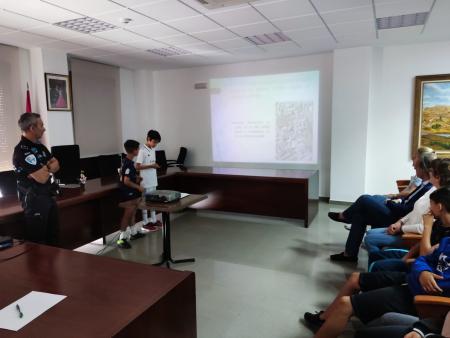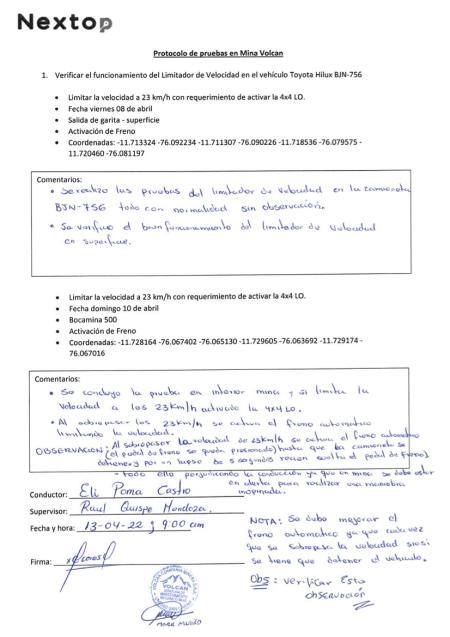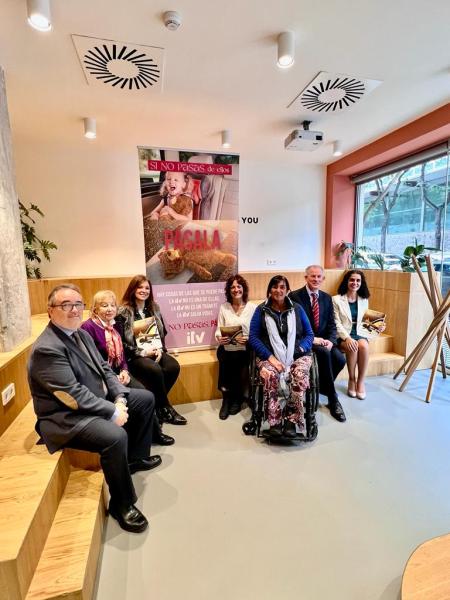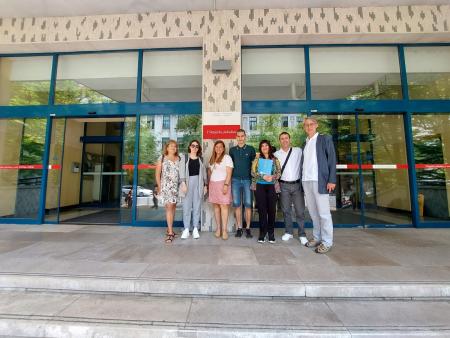Our members are dedicated to improving road safety and sharing their knowledge with the wider community. Here, you can explore our members' good practices – initiatives that have been assessed for their effectiveness in addressing a road safety problem and have proven results.
Get inspired – and sign up to share your good practices too!

Thursday, May 25, 2023
Por una parte, uno de los problemas más graves a los que se enfrenta la sociedad actual es el problema de la movilidad y concretamente la urbana, desplazarse de un lugar a otro, ya sea como peatón, pasajero o conductor, conlleva ciertos riesgos, provocado no solo por el incumplimiento de las normas, sino también por una deficitaria o escasa señalización. Dicho incumplimiento sumado a la falta de percepción de estos riesgos, supone un aumento en el número de accidentes de tráfico y, por lo tanto, el número de víctimas. La Organización Mundial de la Salud (OMS) ha considerado el problema de las muertes por accidentes de tráfico como una auténtica pandemia, ya que cada año mueren millones de personas por este motivo y actualmente se considera una de las tres principales causas de muerte en el mundo.
Dentro de los desplazamientos que las personas realizan a diario en El Casar de Escalona, la Policia Local va a trabajar con el alumnado para garantizar “un entorno vial seguro” en el municipio, queriendo ejecutar una primera fase de este proyecto en el trayecto que realizan los niños y niñas que cursan sus estudios en CEIP Ntra. Sra de Hortum Sancho de El Casar de Escalona junto a los padres/madres, abuelos/as, etc, al cual se le va a denominar “entorno escolar seguro”, con el cual, se va a trabajar sobre los problemas de seguridad vial, identificados como factores de riesgos, relacionados con ausencia de señalización en cruces de calles o en pasos de peatones, deficiencias en el cumplimiento de normas sobre accesibilidad para personas con alguno tipo de discapacidad ( rebajes de acera, acceso a comercios, etc), instalación de mobiliario urbano en aceras que obstaculizan el paso de peatones, aceras impracticables, etc.
Trabajando en esta dirección, también se quiere conseguir que todos los padres y madres se conciencien y actúen con responsabilidad, es decir, que vean que el trabajo que han realizado estos niños y niñas, tenga unos resultados positivos y de alguna manera que modifiquen sus comportamientos a la hora de acompañar a los pequeños tanto como peatones, cruzando por los pasos de peatones, como de conductor respetando las señales, simplemente algo tan sencillo como cumplir las normas de circulación.
Es evidente que las edades que comprende el curso de 6º de primaria, no tiene una percepción real del riesgo que supone los comportamientos inadecuados como usuarios de la vía o de la importancia que tiene una señalización eficiente y correcta, por este motivo se trabajará de una manera activa con este alumnado para conseguir que esta percepción cambie, y lograr uno de los desafíos más complicados de poder llevar a cabo, que son el cambio de hábitos y conductas en el uso de las vías públicas tanto para 6º de primaria directamente e indirectamente para el resto de personas que se verá beneficiadas de las modificaciones que se ejecutarán.
Dentro de los desplazamientos que las personas realizan a diario en El Casar de Escalona, la Policia Local va a trabajar con el alumnado para garantizar “un entorno vial seguro” en el municipio, queriendo ejecutar una primera fase de este proyecto en el trayecto que realizan los niños y niñas que cursan sus estudios en CEIP Ntra. Sra de Hortum Sancho de El Casar de Escalona junto a los padres/madres, abuelos/as, etc, al cual se le va a denominar “entorno escolar seguro”, con el cual, se va a trabajar sobre los problemas de seguridad vial, identificados como factores de riesgos, relacionados con ausencia de señalización en cruces de calles o en pasos de peatones, deficiencias en el cumplimiento de normas sobre accesibilidad para personas con alguno tipo de discapacidad ( rebajes de acera, acceso a comercios, etc), instalación de mobiliario urbano en aceras que obstaculizan el paso de peatones, aceras impracticables, etc.
Trabajando en esta dirección, también se quiere conseguir que todos los padres y madres se conciencien y actúen con responsabilidad, es decir, que vean que el trabajo que han realizado estos niños y niñas, tenga unos resultados positivos y de alguna manera que modifiquen sus comportamientos a la hora de acompañar a los pequeños tanto como peatones, cruzando por los pasos de peatones, como de conductor respetando las señales, simplemente algo tan sencillo como cumplir las normas de circulación.
Es evidente que las edades que comprende el curso de 6º de primaria, no tiene una percepción real del riesgo que supone los comportamientos inadecuados como usuarios de la vía o de la importancia que tiene una señalización eficiente y correcta, por este motivo se trabajará de una manera activa con este alumnado para conseguir que esta percepción cambie, y lograr uno de los desafíos más complicados de poder llevar a cabo, que son el cambio de hábitos y conductas en el uso de las vías públicas tanto para 6º de primaria directamente e indirectamente para el resto de personas que se verá beneficiadas de las modificaciones que se ejecutarán.

Thursday, May 25, 2023
El principal desafío fue poder controlar la velocidad excesiva en los conductores a través de un sistema de ISA (Intelligent Speed Assistance) del tipo OEM, el que puede ser instalado en cualquier vehículo liviano, pesado, eléctrico, o de trabajo pesado, regulando la velocidad, aun cuando el conductor intente sobrepasar el límite permitido.

Thursday, May 25, 2023
The main road safety challenge addressed in the thesis is the knowledge gap in understanding co-occurring accident conditions. The official road traffic accident statistics in Austria currently focus on identifying a single explicit accident cause for each accident, such as speeding. However, accidents are often multicausal events, involving multiple conditions or factors simultaneously. This thesis aims to investigate and analyze co-occurring accident conditions to gain a more comprehensive understanding of the factors contributing to road accidents.

Thursday, May 25, 2023
• Universidad Carlos III de Madrid
El Instituto de Seguridad de los Vehículos Automóviles "Duque de Santomauro" (ISVA) de la Universidad Carlos III de Madrid ha sido creado con el objetivo de contribuir a la seguridad vial por medio de la investigación, generando equipos multidisciplinares que cubren todas las necesidades de la sociedad. Además proporcionan soporte y asesoría técnica al sector dedicado a la INSPECCIÓN TÉCNICA DE VEHÍCULOS, garantizando la calidad del servicio que se presta a la sociedad.
Se adjuntan videos virtuales del campus y fotos:
https://drive.google.com/file/d/1tWpxZsHwYDO5u2RIVJZVBbzd7fNgBoCK/view?usp=sharing
https://hosting01.uc3m.es/semanal3/visita_virtual/leganes_ext_es/leganes_ext.html
https://www.youtube.com/watch?v=3VmCNDKm0lo
• AECA-ITV
AECA-ITV, es una asociación de ámbito nacional, sin ánimo de lucro, que se constituye en 1982 a petición del Ministerio de Industria y Energía y está integrada por la práctica totalidad de las entidades de ITV, tanto públicas como privadas, que prestan el servicio de ITV en España. Asimismo, forman parte de la Asociación la Guardia Civil y el Cuerpo Nacional de Policía.
En la actualidad, suman 80 empresas asociadas, que gestionan. 406 centros de ITV con 1010 líneas de inspección; dando empleo a unos 7.000 empleados cualificados (unos 875 ingenieros, 5.260 inspectores y 865 administrativos).
Se adjunta nuestro dossier de presentación, para mayor información al respecto.
• ITV
La Inspección Técnica de Vehículos (ITV) (https://www.aeca-itv.com/la-itv/la-itv-en-diez-pasos/ ) es un servicio público y de interés general que se presta en España a todos los ciudadanos titulares de vehículos, con carácter obligatorio, y que tiene por finalidad la acreditación, por parte de un operador imparcial e independiente (las estaciones de ITV), que todos los elementos de seguridad de los vehículos se encuentran en un estado que permite su circulación conforme la normativa aplicable.
La ITV es un término con el que todos los conductores estamos familiarizados pero del que no siempre somos conscientes de su importancia. Dado que se trata de una obligación legal con la que deben cumplir todos los vehículos, con diferente periodicidad en función de su tipología, son muchas las personas que ven esta evaluación como un simple trámite que hay que hacer para poder seguir circulando. Sin embargo, su alcance va mucho más allá.
Los controles periódicos de la ITV tienen como principal objetivo salvar vidas y lo hacen desde dos aristas: la seguridad vial y la protección del medio ambiente. Por un lado, detectan posibles fallos mecánicos en los vehículos que podrían aumentar el riesgo de sufrir siniestros viales, asegurando que cumplen con los estándares mínimos de seguridad para poder circular. Y, por otro, estas inspecciones juegan también un papel clave en la protección de la salud de todos los ciudadanos, al regular la calidad medioambiental controlando ruidos, partículas y gases nocivos.
• CONCIENCIACIÓN
Es necesario cambiar la percepción de los ciudadanos hacia la ITV, para entender que la labor preventiva que realizan las estaciones es fundamental para determinar si el vehículo está o no en condiciones óptimas para circular y, por tanto, gracias a ello se consigue reducir y evitar riesgos. Y es que entre las causas que motivan o agravan los siniestros en carretera están las debidas a fallos o defectos mecánicos en los vehículos implicados. Un vehículo con defectos en sistemas como los frenos, la suspensión, la dirección o los neumáticos tiene más probabilidad de provocar o sufrir un siniestro vial.
De ahí la importancia de mantenerlos en buenas condiciones y asegurarnos que tienen la ITV en vigor. El estado de la ITV de un vehículo guarda relación directa con su seguridad. Es un procedimiento sencillo que puede significar la diferencia entre sufrir o no un siniestro vial, entre vivir o morir; porque es muy claro el mensaje: la ITV salva vidas.
Se trata de aspectos que han sido objeto de análisis por la Universidad Carlos III de Madrid, en el estudio que se presenta de la “Contribución de la ITV a la Seguridad Vial y al Medio Ambiente” (en adelante, el estudio).
Se trata de un estudio pionero ya que cuantifica científicamente potenciales siniestros viales, heridos y fallecidos que podrían salvarse en caso de que todos los vehículos cumpliesen con su obligación de tener la ITV al día. Es decir, cuantifica científicamente fallecidos, heridos y siniestros viales antes de que hayan ocurrido para poder cambiar el futuro.
El objetivo del estudio es poder obtener y mostrar los efectos positivos de pasar la ITV de nuestros vehículos, evidenciando así que está en nuestra mano salvar vidas si la ITV está en vigor, con la finalidad última de llegar a cero víctimas en carretera.
En concreto, el estudio acredita que gracias a la labor realizada desde las estaciones de ITV se salvan al año 294 víctimas mortales, 24.753 heridos de distinta consideración y se evitan al menos 29.158 siniestros viales.
Adicionalmente, las víctimas prematuras por exposición a contaminantes atmosféricos se evalúan en 782 aproximadamente.
Y, por último, evitar estas víctimas mortales, heridos y siniestros viales a la sociedad supone un ahorro económico de 1.725 millones de euros.
Estas cifras demuestran la magnitud de la importancia de las inspecciones técnicas. La sociedad tiene que concienciarse sobre la importancia de la labor de las inspecciones técnicas para garantizar la seguridad vial y la protección del medio ambiente.
Las conclusiones del estudio reforzaron la campaña de publicidad “Si no pasas, PÁSALA” con el objetivo de concienciar a la sociedad de la labor que realiza la ITV en la reducción de fallecidos en siniestros viales y por efectos de la contaminación.
La campaña está integrada de piezas tanto gráficas como audiovisuales en las que se resalta que la ITV no es un trámite, sino una acción que salva vidas, con un mensaje clave: “hay cosas de las que se puede pasar, pero la ITV no es una de ellas”. La iniciativa contempla tres aspectos: gracias a la ITV, salvamos vidas, cuidamos el medio ambiente y evitamos graves consecuencias.
Aunque la campaña “Si no pasas, pásala” está centrada en el territorio nacional, recibió también el apoyo de instituciones internacionales:
https://citainsp.org/2022/03/23/a-campaign-to-raise-awareness-about-pti/
El Comité Internacional de Inspección de Vehículos de Motor CITA, por ejemplo, ha manifestado su apoyo expreso a la campaña y se ha hecho eco de la misma, en su página web y newsletter, resaltando la propuesta de AECA-ITV para sensibilizar a la sociedad sobre la importancia de las inspecciones técnicas de vehículos para salvar vidas y cuidar el medio ambiente.
https://citainsp.org/
El Instituto de Seguridad de los Vehículos Automóviles "Duque de Santomauro" (ISVA) de la Universidad Carlos III de Madrid ha sido creado con el objetivo de contribuir a la seguridad vial por medio de la investigación, generando equipos multidisciplinares que cubren todas las necesidades de la sociedad. Además proporcionan soporte y asesoría técnica al sector dedicado a la INSPECCIÓN TÉCNICA DE VEHÍCULOS, garantizando la calidad del servicio que se presta a la sociedad.
Se adjuntan videos virtuales del campus y fotos:
https://drive.google.com/file/d/1tWpxZsHwYDO5u2RIVJZVBbzd7fNgBoCK/view?usp=sharing
https://hosting01.uc3m.es/semanal3/visita_virtual/leganes_ext_es/leganes_ext.html
https://www.youtube.com/watch?v=3VmCNDKm0lo
• AECA-ITV
AECA-ITV, es una asociación de ámbito nacional, sin ánimo de lucro, que se constituye en 1982 a petición del Ministerio de Industria y Energía y está integrada por la práctica totalidad de las entidades de ITV, tanto públicas como privadas, que prestan el servicio de ITV en España. Asimismo, forman parte de la Asociación la Guardia Civil y el Cuerpo Nacional de Policía.
En la actualidad, suman 80 empresas asociadas, que gestionan. 406 centros de ITV con 1010 líneas de inspección; dando empleo a unos 7.000 empleados cualificados (unos 875 ingenieros, 5.260 inspectores y 865 administrativos).
Se adjunta nuestro dossier de presentación, para mayor información al respecto.
• ITV
La Inspección Técnica de Vehículos (ITV) (https://www.aeca-itv.com/la-itv/la-itv-en-diez-pasos/ ) es un servicio público y de interés general que se presta en España a todos los ciudadanos titulares de vehículos, con carácter obligatorio, y que tiene por finalidad la acreditación, por parte de un operador imparcial e independiente (las estaciones de ITV), que todos los elementos de seguridad de los vehículos se encuentran en un estado que permite su circulación conforme la normativa aplicable.
La ITV es un término con el que todos los conductores estamos familiarizados pero del que no siempre somos conscientes de su importancia. Dado que se trata de una obligación legal con la que deben cumplir todos los vehículos, con diferente periodicidad en función de su tipología, son muchas las personas que ven esta evaluación como un simple trámite que hay que hacer para poder seguir circulando. Sin embargo, su alcance va mucho más allá.
Los controles periódicos de la ITV tienen como principal objetivo salvar vidas y lo hacen desde dos aristas: la seguridad vial y la protección del medio ambiente. Por un lado, detectan posibles fallos mecánicos en los vehículos que podrían aumentar el riesgo de sufrir siniestros viales, asegurando que cumplen con los estándares mínimos de seguridad para poder circular. Y, por otro, estas inspecciones juegan también un papel clave en la protección de la salud de todos los ciudadanos, al regular la calidad medioambiental controlando ruidos, partículas y gases nocivos.
• CONCIENCIACIÓN
Es necesario cambiar la percepción de los ciudadanos hacia la ITV, para entender que la labor preventiva que realizan las estaciones es fundamental para determinar si el vehículo está o no en condiciones óptimas para circular y, por tanto, gracias a ello se consigue reducir y evitar riesgos. Y es que entre las causas que motivan o agravan los siniestros en carretera están las debidas a fallos o defectos mecánicos en los vehículos implicados. Un vehículo con defectos en sistemas como los frenos, la suspensión, la dirección o los neumáticos tiene más probabilidad de provocar o sufrir un siniestro vial.
De ahí la importancia de mantenerlos en buenas condiciones y asegurarnos que tienen la ITV en vigor. El estado de la ITV de un vehículo guarda relación directa con su seguridad. Es un procedimiento sencillo que puede significar la diferencia entre sufrir o no un siniestro vial, entre vivir o morir; porque es muy claro el mensaje: la ITV salva vidas.
Se trata de aspectos que han sido objeto de análisis por la Universidad Carlos III de Madrid, en el estudio que se presenta de la “Contribución de la ITV a la Seguridad Vial y al Medio Ambiente” (en adelante, el estudio).
Se trata de un estudio pionero ya que cuantifica científicamente potenciales siniestros viales, heridos y fallecidos que podrían salvarse en caso de que todos los vehículos cumpliesen con su obligación de tener la ITV al día. Es decir, cuantifica científicamente fallecidos, heridos y siniestros viales antes de que hayan ocurrido para poder cambiar el futuro.
El objetivo del estudio es poder obtener y mostrar los efectos positivos de pasar la ITV de nuestros vehículos, evidenciando así que está en nuestra mano salvar vidas si la ITV está en vigor, con la finalidad última de llegar a cero víctimas en carretera.
En concreto, el estudio acredita que gracias a la labor realizada desde las estaciones de ITV se salvan al año 294 víctimas mortales, 24.753 heridos de distinta consideración y se evitan al menos 29.158 siniestros viales.
Adicionalmente, las víctimas prematuras por exposición a contaminantes atmosféricos se evalúan en 782 aproximadamente.
Y, por último, evitar estas víctimas mortales, heridos y siniestros viales a la sociedad supone un ahorro económico de 1.725 millones de euros.
Estas cifras demuestran la magnitud de la importancia de las inspecciones técnicas. La sociedad tiene que concienciarse sobre la importancia de la labor de las inspecciones técnicas para garantizar la seguridad vial y la protección del medio ambiente.
Las conclusiones del estudio reforzaron la campaña de publicidad “Si no pasas, PÁSALA” con el objetivo de concienciar a la sociedad de la labor que realiza la ITV en la reducción de fallecidos en siniestros viales y por efectos de la contaminación.
La campaña está integrada de piezas tanto gráficas como audiovisuales en las que se resalta que la ITV no es un trámite, sino una acción que salva vidas, con un mensaje clave: “hay cosas de las que se puede pasar, pero la ITV no es una de ellas”. La iniciativa contempla tres aspectos: gracias a la ITV, salvamos vidas, cuidamos el medio ambiente y evitamos graves consecuencias.
Aunque la campaña “Si no pasas, pásala” está centrada en el territorio nacional, recibió también el apoyo de instituciones internacionales:
https://citainsp.org/2022/03/23/a-campaign-to-raise-awareness-about-pti/
El Comité Internacional de Inspección de Vehículos de Motor CITA, por ejemplo, ha manifestado su apoyo expreso a la campaña y se ha hecho eco de la misma, en su página web y newsletter, resaltando la propuesta de AECA-ITV para sensibilizar a la sociedad sobre la importancia de las inspecciones técnicas de vehículos para salvar vidas y cuidar el medio ambiente.
https://citainsp.org/

Thursday, May 25, 2023
With our innovative project we want to involve university students in road safety. Slow City is a campaign based on the creation of various short videos made by the students about the benefits of speed reduction in our cities, especially saving lifes. Our main goal is to engage the students, but also the general youth by posting the videos and raising awareness peer-to-peer.